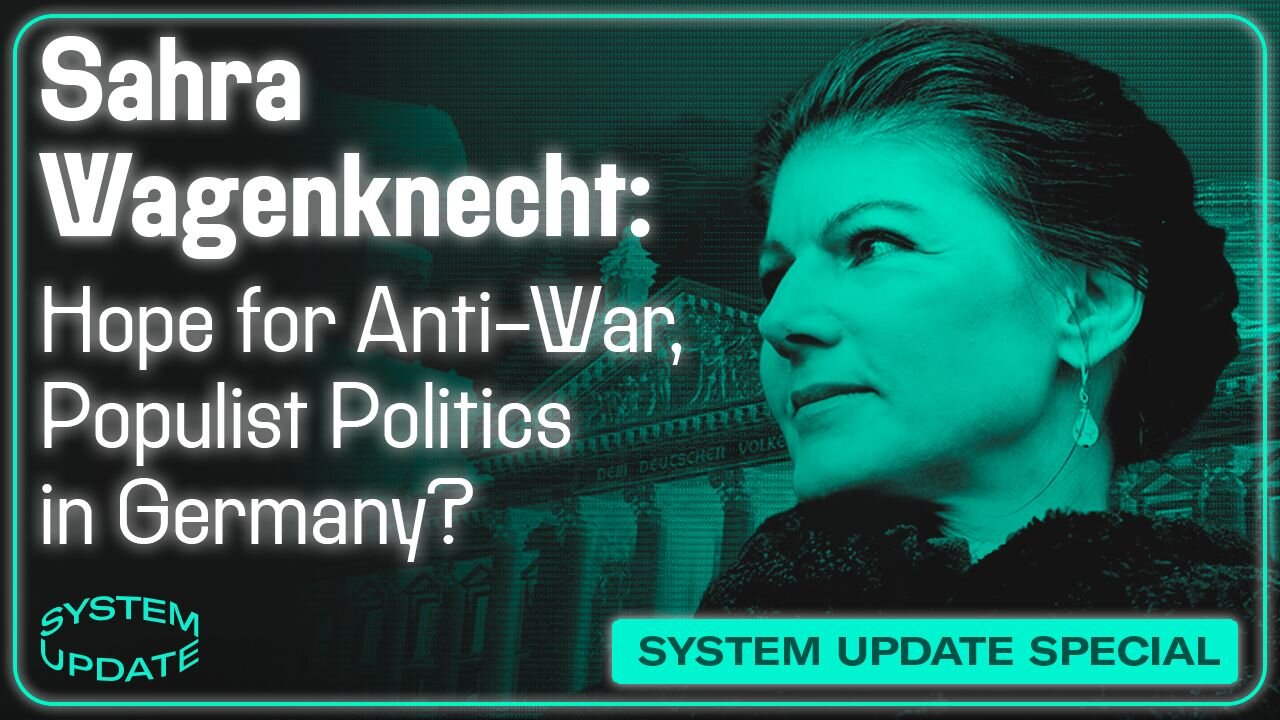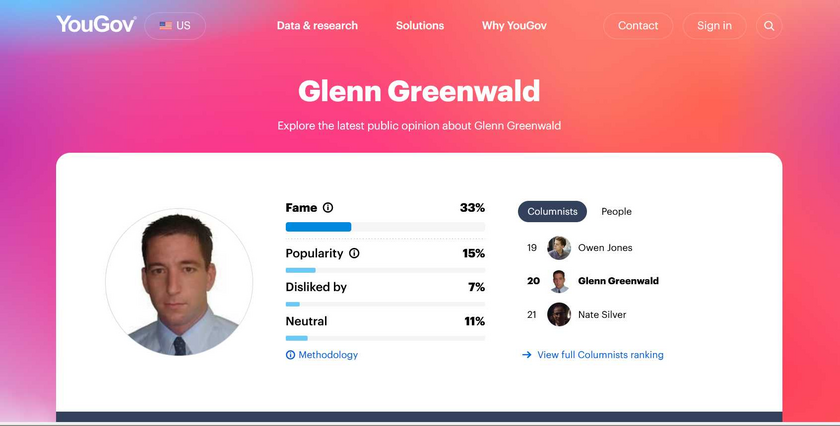Watch the full episode here:

NOTE: Exceptionally, this English-language transcript of the interview with Sahra Wagenknecht, originally conducted in German, was released without a paywall for all to enjoy. Locals subscribers have access to a transcript of every System Update episode.
Interview: Sahra Wagenknecht
G. GREENWALD: Okay. Sahra, Guten Tag. It's very good to see you again. Thank you for giving us some time.
SAHRA WAGENKNECHT: A pleasure. I'm also really looking forward to the interview.
G. GREENWALD: Let's start with the war in Ukraine. We spoke to you a little bit more than a year ago about your opposition to Germany's involvement in the war. How—14 months later—do you now see this war between Russia and Ukraine?
SAHRA WAGENKNECHT: Yes, it is horrible. This war is ongoing. Clearly, we can see that everything we've been told—including in Germany—such as, we have to supply the tanks, we have to supply the weapons and that would lead to a solution but none of this has worked. And Germany has become more and more of a war party. There are now politicians in Germany who are calling for the war to be taken into Russia with Taurus missiles. That is a very dangerous development. And it has demonstrated in all honesty that anyone who wants to end this war will have to negotiate and finally make a serious offer for negotiations. And I am very pleased that the Pope is also calling for this, that many countries in the South are calling for this, and that we in Germany will continue to call for this. But the German government has so far entirely opposed this.
G. GREENWALD: So, independent of moral arguments or geostrategic arguments, it has become clear to everyone that Ukraine cannot possibly win this war, especially as victory was defined by NATO as Russians expelled from all Ukrainian territory, including Crimea. The Ukrainians have no artillery, and no people left to send to the front line. The only movements in the front line have been in Russia's favor. Has support in Germany for funding and arming the war in Ukraine changed at all over the last year?
SAHRA WAGENKNECHT: There is a considerable proportion of the population who see things differently and are also fed up with being told that Ukraine could win this war because they can see that they are unable to do so. But there is a very, very strong media debate in Germany that amounts to the narrative that if we don't stop Putin now, he will invade Poland or Lithuania or the Baltic states. In other words, they are now trying to sway people, who have also come to the realisation that arms deliveries have not led to a turnaround in the war, convinced by creating a new narrative. The new narrative is that we have to do everything we can to stop Putin because if there were to be another compromise now, he would invade other countries. And unfortunately, there are a lot of people in West Germany, and less so in East Germany, who believe that. So you can't say that the mood has now completely changed.
G. GREENWALD: If you look at the history of the 20th century, the one lesson it shows is that very bad things happen when Germany and Russia are antagonistic, or see each other as enemies or involved in wars. And yet we've had the German Chancellor many times give pro-war speeches, saying that Germany must ensure Russia's defeat. What dangers does that create? And what do you think should be the relationship between Germany and Russia?
SAHRA WAGENKNECHT: Yes, relations are very bad. I can imagine that old traumas have been awakened in many people in Russia when they hear that German politicians want to supply weapons to attack Russia. Now, for example, it became public in Russia that there was a discussion among German officers about the delivery of Taurus missiles, where there was a debate about whether it would be possible to deliver them and disguise the fact that they came from Germany. And the Taurus missiles are so dangerous because Ukraine could use them to attack Moscow. They could destroy ministries and the Kremlin in Moscow. They could attack military bases, even nuclear bases in Russia. And when German officers discuss the possibility of delivering such missiles and how it might be possible to conceal the fact that they came from Germany, I can imagine that this will of course reawaken old fears in Russia and that a great deal of historical experience, especially among older people, may bring this back to the surface. The relationship between Germany and Russia is at a low point and that is very regrettable. And it is also incredibly foolish of the Germans because we are harming ourselves above all. Our economy is in crisis because we can't import cheap energy. No gas, no Russian oil. The German economy is now shrinking for the second time this year, probably. We have high inflation, people have lost purchasing power and they are afraid of their industrial jobs. So above all, it is a policy that is damaging the German economy and the people in Germany.
G. GREENWALD: So, at the beginning of the war, in 2022, there was a delusion in the U.S. and in Europe that maybe Ukraine could really win. But I think now almost nobody believes that Ukraine can expel Russia from Ukrainian territory. So what do you think are the real motives in Germany and Europe for why they want to continue this war indefinitely?
SAHRA WAGENKNECHT: Yes, of course, it's a permanent gateway. The war is also very, very expensive for Russia. This means that the economic sanctions will of course remain in place as long as this war continues. You also don't want to admit that you haven't achieved your goals. The German Foreign Minister stepped up at the beginning of the war and said, "We want to ruin Russia", and Russia has not been ruined. On the contrary, Russia now has a close alliance with China and is really very well-paced in the BRICS. Yes, the alliance is getting bigger, but you don't want to admit that, you don't want to acknowledge that either. And I think the German media is much more one-dimensional here. I have the feeling, I also read some of the American press, that there is a more open discussion there about the question of how we can perhaps end this war, how we can get out of it. Meanwhile, for example, the parliamentary group leader of the governing party SPD (Social Democrats) in the Bundestag addressed the issue here, saying that perhaps we need to discuss putting a halt to the war. He was attacked terribly for that. So to address a self-evident fact that we need to end this war means—if you are a member of the SPD in Germany and you recognize that—you will be beaten up for it. The Pope said in an interview that Ukraine needs to consider how negotiations can take place out of self-interest, which was also criticized in the German press. It was said that the Pope was calling on Ukraine to surrender, which he never did. Unfortunately, we also lack diversity and positions in the media here to promote negotiations and to advocate an end to the war, which tends to be pushed very, very much into a corner; these are the people who are allied with Putin, who is running Putin propaganda. And that, of course, has a certain impact on how many people here in the country view the war.
G. GREENWALD: It's exactly the same in the United States, everything you just described. Since we last spoke, one of the major developments is that you left the longtime party to which you belong, Die Linke, or the left, to form a new party called Sahra Wagenknecht Alliance for Reason and Justice. Some polls now show your new party polling as high as 20%. One of the things that is most obvious is that the word Linke, left, is not in your party's name, your new party's name. Why is that? And what motivated you to leave the party that you were a member of for so long?
SAHRA WAGENKNECHT: Yes, the Left has unfortunately alienated a large part of its voters. It has mainly focused on these so-called modern, progressive issues, which are mainly within academic milieus, in well-off, privileged milieus, and anti-racism, but also more out of symbolic politics, such as trans debates. But the truly fundamental social problems, wages, pensions, and social fears about the future, have been increasingly lost sight of. And that's why the Left has become very, very weak. Many former voters of the Left have moved to the right and are now voting for the AfD [Alternative für Deutschland]. It's a right-wing party in Germany and at some point, I simply said to myself along with others that we no longer want to watch how the left of the party spectrum is basically just going downhill and the right is benefiting, but rather we want a new force to emerge in Germany that embodies social justice and reason, but also peace policy. Die Linke is increasingly taking very, very unclear positions on the issue of peace policy, for example. A year ago we had a big peace rally with over 50,000 people. The left distanced itself and did not support it. And there are now clear voices on the left that are campaigning for arms deliveries to Ukraine. And that has also contributed to the Left losing voters. And this is where the BSW [Bündnis Sahra Wagenknecht] is now a clear voice for peace, and negotiations, but also for social justice.
G. GREENWALD: So this formula that you're embracing, this new kind of politics, let's say, defending traditional left-wing economic policies to help the working class, but at the same time avoiding or rejecting these very elite left-wing dogmas on culture war issues, seems like that's becoming increasingly visible in other countries in northern Europe as well. Do you see the success of that kind of combination of politics, defending the working class, focusing on their economics, but avoiding these more elite culture war questions as being a framework for success in other left-wing parties in other countries in Northern Europe?
SAHRA WAGENKNECHT: Well, we can't complain about the response and the support we have. It's been very, very strong. We only founded the party in January and we're currently at over 5%, in Germany, in some eastern German states we're in double figures. That really is something that is quite unusual when a party is so new. And that's why I can tell that there really was a big gap in the political system that we are now filling. And I am firmly convinced that we can also change politics in Germany as a result. The stronger we become – we hope to achieve a good result in the European elections – the more we can influence German politics. So if we campaign as a voice for peace, then this will also put pressure on the German government. Or, if we make it an issue that wages have been falling in Germany for three years. That is something that has never happened before in the history of the Federal Republic of Germany. It's actually a scandal that people have been losing income for three years and are completely resisting it. And at the same time, we also recognize that people have a longing for stability, and security, that you can't ignore that. In Germany, we live with very high levels of migration. This is something that the Left has always denied. In my opinion, we consider this to be an important issue because it takes place primarily in poor neighborhoods and not in rich ones. So this is already a policy, a policy offer, it also has a logic to it and it's very well received by people.
G. GREENWALD: In the United States, there was a long-time opposition to mass emigration that came mostly from the left, from labor unions, who argued that the people who suffer from mass migration tend to be the poorest, and the working class people whose jobs are taken, whose wages are declined. One of the first, and I guess, most important events that began to drive a wedge between you and your party was your opposition to the policy of Angela Merkel to accept a million refugees from Syria. What do you see as the conflict between immigration, on the one hand, and the interest of the German poor and the working class on the other?
SAHRA WAGENKNECHT: Yes, there is a conflict. My own father is from Iran. I understand that people are looking for a better life and that's why they move to wealthy countries. And I also think that we should talk about why people are fleeing their homeland. Many of those who come to Germany are from countries where wars have taken place and these wars have often been waged by the West, or in part, as in Syria, the West has armed certain groups there and supported this civil war because it wanted a regime change. So there are causes of displacement and migration. But you don't eliminate the causes by saying we're going to open the borders and invite everyone in. You need to achieve changes in the home countries. But here in Germany, it is also the case that housing shortages have of course worsened in the poorer residential areas. There is a lack of daycare places, the schools are swamped, there are many districts where first grade is starting and 80% of the children can't speak a word of German. Integration doesn't work either when the numbers are so high. And that's why the less privileged in Germany are very strongly opposed to such high levels of migration. Incidentally, people who have a migration background themselves even express their desire that this uncontrolled migration be stopped. And that's why this is an important issue for us because it strengthens the Right. High levels of migration, as it is happening now, naturally favor low wages and high rents, overburden the infrastructure and ultimately strengthen the Right.
G. GREENWALD: One of the best-known parties in Germany that claims to be on the left is the Green Party, and it has become successful. It now has, among other people, Annalena Baerbock as its foreign minister. And I recall when the Greens were running, they ran on a platform of what they called a feminist foreign policy. This idea that if you have women in positions of power in foreign policy, it would make war less likely. And yet you have Baerbock and the Greens, along with the president of the EU, who are among the most aggressive supporters of Germany's involvement in the war in Ukraine, Israel's war in Gaza, support for NATO generally. Why did that happen? And how do you understand what role the Green Party plays in Germany?
SAHRA WAGENKNECHT: Yes, the Greens really are a remarkable phenomenon. The party emerged from the peace movement. So alongside the question of environmental policy, peace policy was a very, very big issue for the first generation of the Greens. Petra Kelly was a great pacifist. She co-founded the Greens. Today, the Greens really are the biggest warmongers. They are the most fanatical about supplying weapons. In some cases, they are people who previously refused to do military service themselves, but who now know all the different types of tanks that are produced in Germany and are pushing aggressively for them to be supplied to Ukraine. Why is that? Well, the Greens are very, very strongly oriented towards the U.S., also on other issues. I can't say for sure why that is, but it is noteworthy. In many respects, the Greens are really the mouthpiece of U.S. politics and represent what is currently being discussed or expected in U.S. politics, and they have completely changed. It certainly also has something to do with this approach of a strong moralization of politics—i.e. you don't do politics to do something good but to be part of the good side. This approach results supposedly to “We are the good guys, the good West is fighting against Putin and the Russian dictatorship”. After all, this too resonates very, very strongly with the Greens as a narrative. In other words, we need to fight for human rights and democracy. It's all a lie. But that's just the Green tone. And in the party, there are now hardly any obvious functionaries who contradict it in any way. There are some in the SPD, but among the Greens, there really is a massive drumbeat for war and also an arrogance towards other countries, which they lecture on how they should be governed, including China, for example. But now the Greens are really the absolute worst when it comes to war policy.
G. GREENWALD: So Ukraine is one war that Germany is providing arms to, but there's another war where Germany is also doing that. That is the war by Israel in Gaza. There's currently a case in the International Court of Justice brought by Nicaragua against Germany, accusing Germany of aiding genocide by providing the arms and bombs to Israel that they use against Palestinian civilians. What is your view of what the German policy toward Israel and its war in Gaza should be?
SAHRA WAGENKNECHT: Yes, I think it's really horrible what we've been seeing in the Gaza Strip for months now. These are war crimes. It's a terrible war against the civilian population, against women, against children. And of course, Germany, or even every German, is special—and they naturally have a different relationship or responsibility towards Israel because of German history, because of the Holocaust. We have always said, and I support this, that we understand or share Israel's right to defend itself against these attacks by Hamas, but what is happening over there has nothing to do with self-defense; it is a major war crime. And that is why we, the BSW, have now submitted a motion in the Bundestag to impose an immediate arms embargo on Israel, i.e. to stop supplying weapons, because Nicaragua is right. Therefore, all countries that supply weapons are partly responsible for this terrible killing in the Gaza Strip. That is why I think it would be deeply appropriate and urgently necessary for us to take a different path here, to stop supplying arms immediately and to condemn this action. Condemn the fact that this is a campaign of revenge and not self-defense. In my opinion, we need to make that very clear. And Netanyahu has now even announced that he may launch a ground offensive on Rafah. And that would take death and horror to a whole new level. So here, I think there is no reason to say that we as Germans should stand on the side of the Israeli government. On the contrary, the Israeli government is basically pursuing a course here that could actually cause the entire Middle East to enter a major war. When I look at the development of relations with Iran, the attack on the Iranian consulate, there is also a possible threat of military escalation. And we absolutely must not allow that to happen, we cannot support it, we need to clearly condemn it and distance ourselves from it, and above all, we need to stop providing weapons.
G. GREENWALD: I think everybody understands the very unique German duty and obligation after the Holocaust and World War II. But I think there are two ways of looking at what Germany's obligation is. One is to say our obligation is just to support Israel in everything that it does, no matter what that is. The other is to say we should oppose genocide and violence against civilians in every instance where it occurs. How does Germany understand the difference between those two options?
SAHRA WAGENKNECHT: In the meantime, the German media, including the German government, has been mildly critical. It's no longer the case that they support everything the Israeli government does. But there is still far too little criticism. I also believe that we have a responsibility to defend Israel's right to exist, but the kind of warfare we are now seeing does not increase security for people in Israel or for Jews worldwide; on the contrary, it endangers it. It is an extremely right-wing Israeli government, whose defense minister even announced at the beginning that they wanted to wage a war against civilians. He spoke of human animals when he spoke of Palestinians. And that wording is fascistoid and we simply need to speak out and recognize that this is not something we can support and that we have no responsibility whatsoever arising from our history in sharing or engaging in such actions and such contempt for humanity, on the contrary, we must condemn such very clearly.
G. GREENWALD: I know that Germany has a much different approach to free speech than the United States has, especially when it comes to expressions of anti-Semitism, for reasons that I think everybody can understand. At the same time, there have been a lot of reports about attempts to punish and repress defenders of the Palestinian cause or critics of Israel, even sometimes when the critics of Israel are Jewish, we see actions by the German government against them. How serious of a problem is this, and do you think it is something to worry about this attack on free speech in the name of defending Israel?
SAHRA WAGENKNECHT: So we don't really have an open debate in Germany, we have a clear narrowing of the spectrum of opinion on many issues, including this one. So anyone who formulates harsh criticism here is met with the sledgehammer of anti-Semitism. For example, my co-chairwoman of the BSW was recently on a television program, a talk show, and she was accused of the BSW being an anti-Semitic party. In other words, we are a party of anti-Semites because we criticize Israel and because we condemn the actions of the Israeli government. This shows that a truly absurd debate is taking place here. We will continue to point out that there is a big difference between anti-Semitism and a completely justified and absolutely necessary criticism of a far-right Israeli government that is committing the worst war crimes in the Gaza Strip.
G. GREENWALD: The last time you and I talked, you made it very clear that you were very opposed to the far-right German party, AfD. And we talked about the differences between yourself and that party because there had been reports that some people on the right are supportive of you and now your new party. And I understand that. But there are also reports, especially in the wake of this explicit racist discussion, that this party may need to be outlawed or prohibited from the ballot. What are your thoughts on how the AfD should be treated legally?
SAHRA WAGENKNECHT: I am strongly against banning the AfD. In my opinion, the whole debate about it is completely misguided. Ultimately, this will help the AfD. We need to deal with its policies and positions. For example, they have European candidates who clearly have a nationalistic worldview. They define being German by blood. That's racism, it's very bad. But you can challenge this in terms of content or you can address the AfD's economic positions. It has a radical position about the market, wants to dismantle the welfare state, and opposes higher minimum wages. Or, for example, it is not a peace party. When it comes to Ukraine, the AfD has positions that are actually similar to ours in that they also advocate a negotiated peace but, regarding the issue of the Gaza conflict, for example, they are a radical supporter of the Israeli government. That has something to do with the fact that they are very strongly anti-Islamic and not ultimately that they are a force for peace. However, you need to challenge them in terms of content and not with blanket bans and blanket exclusion. The main reason they are now gaining so much popularity is because of how poorly Germany is being governed—because the coalition government is so unjust, so haphazard, so incompetent, the economic situation is very bad and people are afraid. That's why the AfD has doubled in the polls in these two years. But that's not because people are right-wing. And if you want to win back these voters, you need to deal with the AfD objectively.
G. GREENWALD: Well, I find your political project not just very interesting, but very relevant to other countries in the West, including the U.S. And it's always a pleasure to speak to you, and I really appreciated your time today.
SAHRA WAGENKNECHT: You're very welcome, thank you very much. And yes, perhaps until next time.
G. GREENWALD: Guten Tag. Tschüss.
SAHRA WAGENKNECHT: Okay. Tschüss.
And that concludes our show tonight.

























